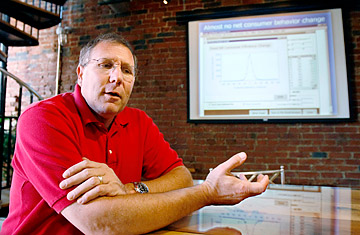
WeatherWise USA CEO Rand Warsaw discusses his patent case, which is being heard by the Supreme Court, at his Pittsburgh offices
(2 of 2)
Under a strict interpretation of the machine-or-transformation test, this process could be ineligible for a patent. As would hundreds of other patents that have been granted in the past decade.
From the point of view of the industry, more patents are not always a blessing. It may be possible to patent things like trading strategies and checkout processes on websites, but it also opens the door for expensive lawsuits from companies that file patents solely with the intent to sue.
Such "patent trolls" or "patent extortionists", as they've come to be known, have become a big headache, especially for technology companies.
"Of the 20 patent lawsuits filed against Google since late 2007, all but two have been filed by plaintiffs who don't make or sell any real product or service — in other words, by non-practicing entities or 'patent trolls'," writes Michelle Lee, Google's head of patents and patent strategy in the company's public policy blog.
There is now a school of thought that making it harder to get a patent is a good thing, though there is hardly any agreement on how to go about limiting patents. Doing so by introducing a new classification, the machines-or-transformations test, is a bad thing, says John F. Duffy, a professor at the George Washington Law School and co-author of a brief on behalf of several technology companies.
"It is just foreclosing patenting in a whole area," says Duffy. Instead, he thinks the court should strengthen rules for what makes an innovation nonobvious. And it could have an effect on a number of industries. More than 70 supporting briefs were filed in this case — including some by tech majors, financial firms and drugmakers — indicating the kind of repercussions this ruling could have on business.
The Supreme Court is expected to announce its decision sometime in the spring of 2010. Till then, the machine-or-transformation test is the law of the land and the patent office is rejecting applications based on the test.
"I call them Bilski rejections," says Keith McWha, a New York City–based patent attorney.
As with most Supreme Court decisions, experts are having a tough time predicting what the Justices will write in their opinion.
The biggest fear for technology companies is that the court might impose a block on an entire class of patents — in this case patents dealing with business methods.
"I see no basis for that happening," says Temple University's Gregory Mandel.
Writing in their judgment, the Justices might call for greater scrutiny of the real-world practical applications of new patents by patent examiners and judges, says Mandel.
As to where that might leave speed-dating, it's anybody's guess.
